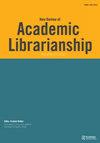Developing Emotionally Intelligent Work Teams Improves Performance and Organizational Wellbeing: A Literature Review
IF 2.3
Q2 INFORMATION SCIENCE & LIBRARY SCIENCE
引用次数: 3
Abstract
Abstract This study examines the benefits to leaders, managers, and employees of developing emotionally intelligent work teams to improve library services and project outcomes. These high performing teams form a cohesive identity based solely upon trust. The characteristics of these groups are considered and their contribution to enhancing organizational wellbeing and performance. Potentially any team is capable of learning these skills by adopting a growth mindset approach to their work. Analyses of the impact of an Emotional Culture and its influence on employee’ behavior and attitudes displayed in the work place is also examined. Outcomes are determined by the type of feelings a leader decides to communicate to them nonverbally. Common problems affecting group dynamics were assessed, and emotional intelligence as an effective strategy to resolve team conflict was employed.发展高情商的工作团队可以提高绩效和组织幸福感:一项文献综述
摘要本研究考察了培养情商高的工作团队以改善图书馆服务和项目成果对领导者、管理者和员工的好处。这些高绩效团队形成了一种完全基于信任的凝聚力。考虑了这些群体的特点及其对提高组织幸福感和绩效的贡献。任何团队都有可能通过在工作中采用成长心态来学习这些技能。分析了情绪文化的影响及其对员工在工作场所表现出的行为和态度的影响。结果取决于领导者决定以非语言方式与他们沟通的感受类型。评估了影响团队动态的常见问题,并将情商作为解决团队冲突的有效策略。
本文章由计算机程序翻译,如有差异,请以英文原文为准。
求助全文
约1分钟内获得全文
求助全文
来源期刊

New Review of Academic Librarianship
Social Sciences-Library and Information Sciences
CiteScore
3.40
自引率
0.00%
发文量
20
 求助内容:
求助内容: 应助结果提醒方式:
应助结果提醒方式:


